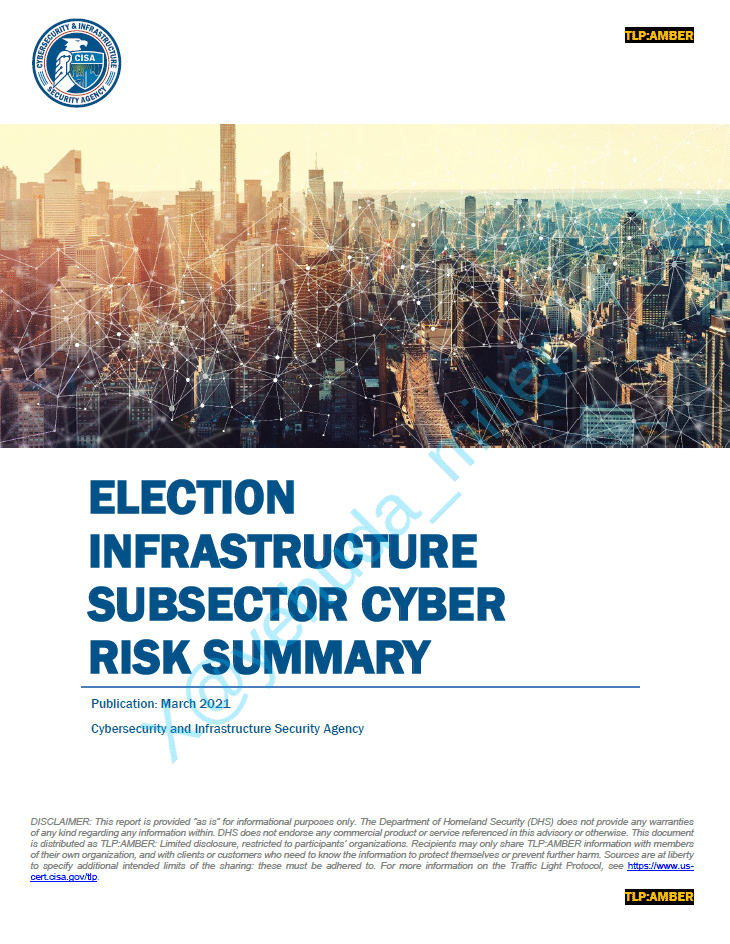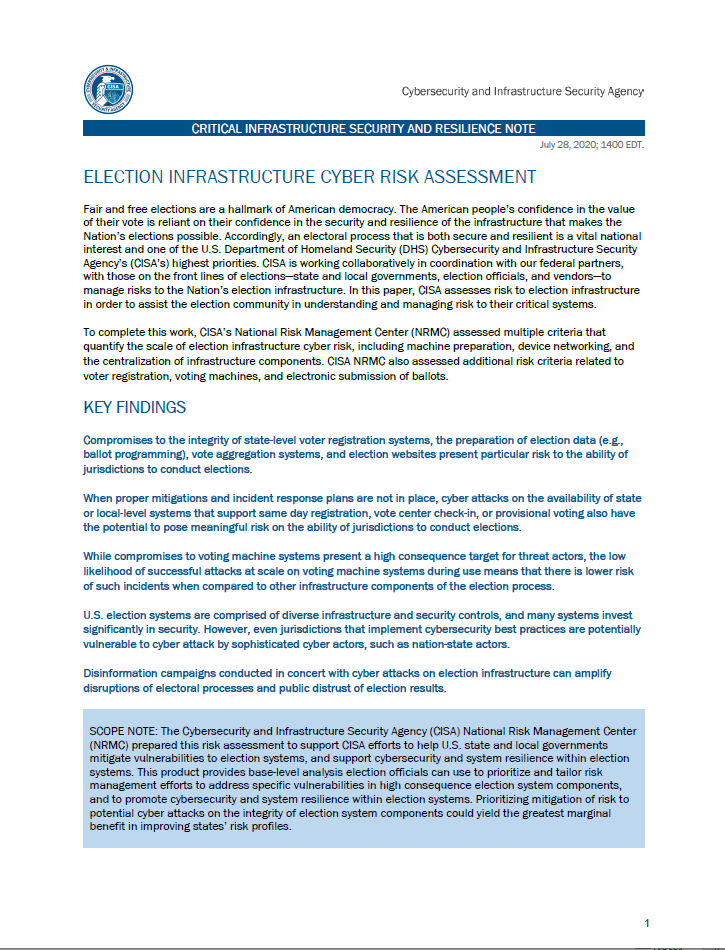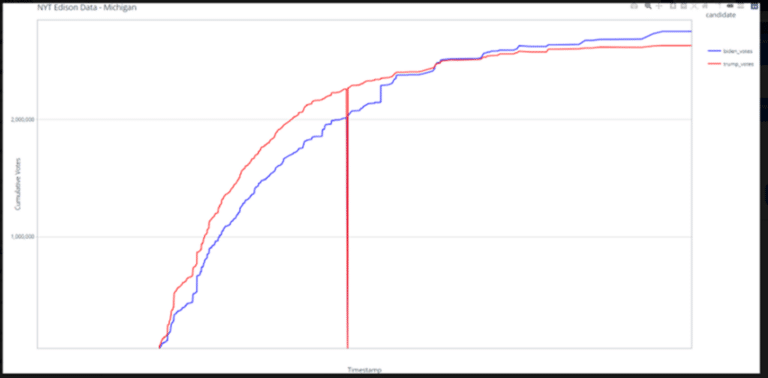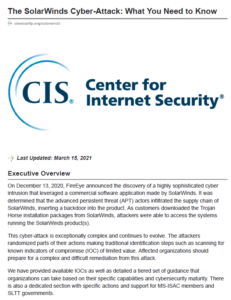TECHNICAL ADVISORIES
Electronic voting systems introduce significant risks to the security of our elections. The Election Crime Bureau has prepared a series of technical advisories to provide election officials with important information regarding these risks that has not otherwise been widely disseminated by government officials or electronic voting system vendors.
Technical Advisory
Decryption Keys
Storing decryption keys in plain text creates a major security vulnerability. If an attacker gains access to the database, they could easily obtain the keys and use them to decrypt sensitive election data such as voter registration information, ballot designs and configurations, and vote tallies and results.
Read ECB AdvisoryTechnical Advisory
Center for Internet Security
The Center for Internet Security (CIS) manages the Election Integrity Information Sharing and Analysis Center (EI-ISAC) under contract to the Department of Homeland Security (DHS) to secure election systems which we are told are not connected to the internet. In this capacity, CIS has privileged access to sensitive election records with negligible public oversight due to its status as a Non-Government Organization (NGO). Significant public trust has been placed in this organization. We believe that the general public should be informed as to the risks associated with this trust.
Read ECB AdvisoryTechnical Advisory
CISA Amber Alert
This report by the Cyber Security and Infrastructure Security Agency (CISA) provides analysis, findings, and recommendations derived from non-attributable cybersecurity trends observed between November 3, 2019, and November 3, 2020—Election Year 2020 (EY20)—among Election Infrastructure (EI) Subsector entities subscribed to services provided by CISA.
CISA’s analysis of the available data for assessed EI entities found:
• 76% of EI entities for which CISA performed a Risk and Vulnerability Assessment (RVA) had spearphishing weaknesses, which provide an entry point for adversaries to launch attacks;
• 48% of entities had a critical or high severity vulnerability on at least one internet-accessible host,4 providing potential attack vectors to adversaries;
• 39% of entities ran at least one risky service on an internet-accessible host, providing the opportunity for threat actors to attack otherwise legitimate services; and
• 34% of entities ran unsupported operating systems (OSs) on at least one internet-accessible host, which exposes entities to compromise.
Technical Advisory
Non-Certified Software
Electronic voting systems are subject to both federal and state certification processes that examine and approved specific configurations of electronic voting systems. Whenever configurations of these systems are deployed which are not consistent with the configurations approved by federal and state authorities, the certification status of the system is effectively nullified calling into question the results of any election conducted by these non-certified configurations.
Read ECB AdvisoryTechnical Advisory
Perjury Allegations
On December 15, 2020, Dominion CEO John Poulos testified under oath with legal counsel present regarding Dominion Voting Systems in use in Michigan during the 2020 General Election. Upon review of his comments against the contents of publicly available records, there are significant grounds to assert that multiple counts of perjury were committed during his testimony. Since his comments served as the basis of many assertions by media and government officials including judges, the veracity of such statements should be examined against the available evidence. On April 16, 2024, the Michigan Grassroots Alliance in cooperation with three Michigan State Representatives filed a criminal complaint with various law enforcement authorities seeking such an examination.
See MGA Criminal ComplaintTechnical Advisory
Election System Risks
CISA’s National Risk Management Center (NRMC) assessed multiple criteria that quantify the scale of election infrastructure cyber risk, including machine preparation, device networking, and the centralization of infrastructure components. CISA NRMC also assessed additional risk criteria related to voter registration, voting machines, and electronic submission of ballots.
See CISA ReportTechnical Advisory
Contingency Hand Counts
Storing decryption keys in plain text creates a major security vulnerability. If an attacker gains access to the database, they could easily obtain the keys and use them to decrypt sensitive election data such as voter registration information, ballot designs and configurations, and vote tallies and results.
Read ECB AdvisoryTechnical Advisory
Digital Controller
Storing decryption keys in plain text creates a major security vulnerability. If an attacker gains access to the database, they could easily obtain the keys and use them to decrypt sensitive election data such as voter registration information, ballot designs and configurations, and vote tallies and results.
Read AdvisoryTechnical Advisory
EAC Investigation
Storing decryption keys in plain text creates a major security vulnerability. If an attacker gains access to the database, they could easily obtain the keys and use them to decrypt sensitive election data such as voter registration information, ballot designs and configurations, and vote tallies and results.
Read ECB AdvisoryTechnical Advisory
Election Night Reporting
Storing decryption keys in plain text creates a major security vulnerability. If an attacker gains access to the database, they could easily obtain the keys and use them to decrypt sensitive election data such as voter registration information, ballot designs and configurations, and vote tallies and results.
Read ECB AdvisoryTechnical Advisory
Chinese Cyberattacks
Storing decryption keys in plain text creates a major security vulnerability. If an attacker gains access to the database, they could easily obtain the keys and use them to decrypt sensitive election data such as voter registration information, ballot designs and configurations, and vote tallies and results.
See DNI LetterTechnical Advisory
SolarWinds Cyberattack
Storing decryption keys in plain text creates a major security vulnerability. If an attacker gains access to the database, they could easily obtain the keys and use them to decrypt sensitive election data such as voter registration information, ballot designs and configurations, and vote tallies and results.
See CIS Advisory











